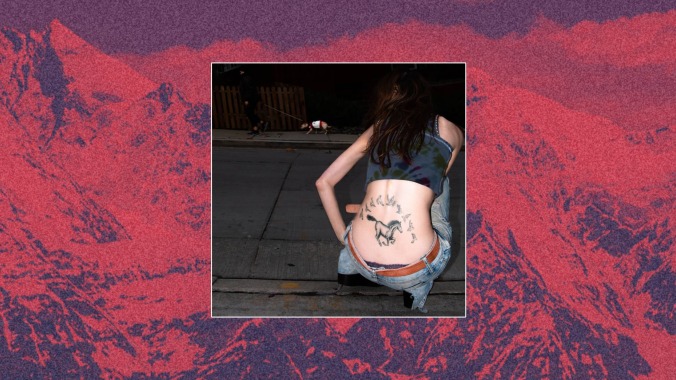A Decade Half-Spent: The Hellp’s Vol. 1
We’re paying tribute to our favorite albums of the 2020s so far with a series of essays.

Despite what its straightforward and inaugural title suggests, Vol. 1 by The Hellp was not meant to be a formal debut album. It’s more of a polished compilation from the Los Angeles-based electronic DJ duo’s previously scrapped and shelved albums with a few new tracks thrown into the mix. It was my first gateway into a devoted yet perplexing act that writes their own lore, wholeheartedly believes in their feverishly hyper and chiptuned sound and dreams big—like, world takeover level big. Unfortunately, that process sometimes comes off as rather arrogant and pretentious to those who reject the so-called “indie sleaze revivalist” movement. But to the young, doe-eyed fans of The Hellp, this is what appeals to them. And for those whose first glimpse into their world is Vol. 1, you get sucked in right away—no need for a conventional introduction.
I first heard of The Hellp—which is Noah Dillon and Chandler Ransom Lucy—when Vol. 1 came out in 2021, before the duo started participating in more press interviews and not much palpable information on them was truly commercially available. Two years later, my classmate from grad school, Olivier Lafontant, spoke to them, the result being a riveting feature for No Bells where he tries to piece The Hellp puzzle together as they spill soliloquies, plans of making it to a performance slot on Jimmy Kimmel one day and their goal of being intentionally pretentious. Now, they just put out their “second” album II—still including some older demos but mostly new material—which has propelled them even more into the spotlight, but at the risk of becoming a sort of Dimes Square, The Dare-like butt of the joke. Memes suggest that the men who used to “hunt and provide” are now “wearing women’s flares and listening to The Hellp,” and someone proclaimed that Barron Trump would be listening to them by his third month at NYU. A majority of the X posts that include their name are some variant of “They are so annoying, but they’re the most important band at this moment.” Through a tantalizing mixture of both upfront and disguised inspirations, Vol. 1 is the result of a jaunting experiment in mingling the electronic side of Kitsuné Maison compilations with pure 2000s dance pop. The two want to hone in a new era for electronic music. “They want to stand eye-to-eye with God while clenching the world by its nutsack,” Olivier wrote in his piece. And if there’s one thing that became clear to me the first time I turned on Vol. 1, they might be doing just that—whether you want to hate on it or not.
Vol. 1 came out during a year where I was self-treating my anxiety by dousing myself in constant, pulsating noise. It was also during the first period of time I got to enjoy a haphazardly-collaged version of post-quarantine college nightlife, which might have contributed to my elevated sense of unease. I was working full time, over-involved in student organizations, taking 16 credits and going out—just because I could now—three times a week. I also was living in my own apartment for the first time and had a roommate and a boyfriend that seemed to be out to scrutinize everything I did. All of the online advice I was reading aimed at overworked “girlbosses” told me to take some time for yourself each day in a quiet, unassuming space. I found a twisted version of that solace in the form of a midnight radio slot at my college’s station where I blasted the most clamorous electroclash-adjacent music on my playlist—each of the 12 songs off The Hellp’s album being my weekly set’s usual suspects.
-

-

-

-

-

-

-

-

-

-

-

-

-

-

-

-

-

-

-

-

-

-

-

-

-

-

-

-

-

-

-

-

-

-

-

-

-

-

-

-








































